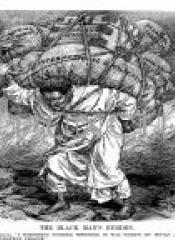Black Man's Burden
Literary Event: The Black Man’s Burden
The poem “The Black man’s Burden” was written and published in 1903 by Lulu Baxter Guy. This poem was written and published in order to change the narrative of Kiplings “White Man’s Burden”. This poem explains what the burdens of being a Black man inAmerica is like. While in Kipling’s “White Man’s Burden”, he expresses that he believes that the white man’s burden is basically taking it on themselves, as a race entirely, to go out into the world and conquer and teach countries and people that are “uncivilized” and bring them to up to par with the rest of the “white world”. In Kipling’s poem he makes it seem that the best, and also the worst, thing about being a white man is having to take it upon themselves and explore and find these underdeveloped worlds and teach them the way of the rest of the white world, and reach out and grab hold of them. It is because of this that Guy wrote his poem, in order to take this narrative and showcase the actual consequences of this thought process. In his poem “The Black Man’s Burden” Guy confronts this colonizing idea in his own poem, while also expanding upon the consequences he says that Black men suffer from because of people with Kiplings ideology. I do believe that Guy wrote this poem with the main audience being white people. However, I believe that this is a poem that anyone could take advantage of reading. I definitely think that in some way Black people, especially of that time period, would benefit from reading this as a sort of eye opener, or to inspire them to realize they deserve better. While I couldn’t find much on how the poem itself was received by the general public, I can imagine that it was not as favorably responded to by the public as “The White Man’s Burden”. In Guy's poem he says, “ Have we not served ye long enough? Been long enough your slave? Cut loose the bands that bind us, Bid us like men be strong”. The meaning behind these couple of lines is Guy saying, hasn’t the Black race given enough to the white men of the world. Not only does he say that Black people have been slaves to white people long enough, but that white people should release them from the control they still have over the Black race. That the white race should allow Black people to live life freely the same way that they are able to. In the article about Balck soldiers it states that “nothing has terrified the mind of white america throughout history more than a black man holding a loaded gun”. While this does not completely relate to the Will Smith Oscar slap, since no guns were involved, I do believe that this quote directly encompasses the reason why Will Smith has gotten the response he has from the world. “ Think of the brave deeds we have done; Look not for all the wrong.” This is a quote from “The Black Man’s Burden” that completely speaks to the Will Smith Oscars situation. This is because, everyone is now only recognizing Will Smith for the physical altercation with Chris Rock, and not for everything else he has done that he has done that is better for not only himself but the rest of the world too. They have now only looked at the wrong he has done this one time, instead of all of the better things he has done throughout his career.
Works Cited:
Marable, M. (1981). The Military, Black People, And The Racist State: A History Of Coercion. The Black Scholar, 12(1), 6–17. http://www.jstor.org/stable/41067961
SCOTT, D. (2011). Kipling, the Orient, and Orientals: “Orientalism” Reoriented? Journal of World History, 22(2), 299–328. http://www.jstor.org/stable/23011713
Guy, L. B. (n.d.). The Black Man's Burden. Cove studio :: Sign in. Retrieved May 1, 2022, from https://studio.covecollective.org/anthologies/sp22-eng-l302-anthology/do...
Related Links:
The Black Man's Burden(H.T. Johnson): https://studio.covecollective.org/anthologies/sp22-eng-l302-anthology/documents/the-black-mans-burden
Toxic Patriotism Entry: https://editions.covecollective.org/chronologies/white-mans-burden-rubyard-kipling

